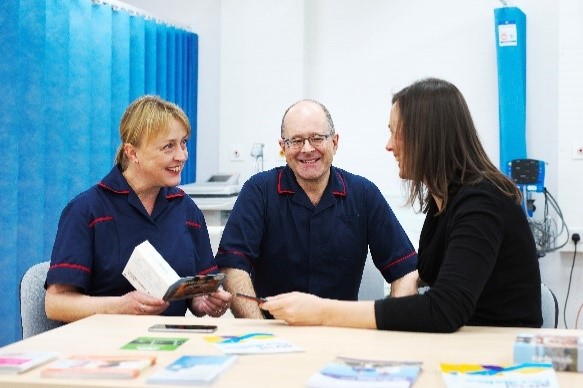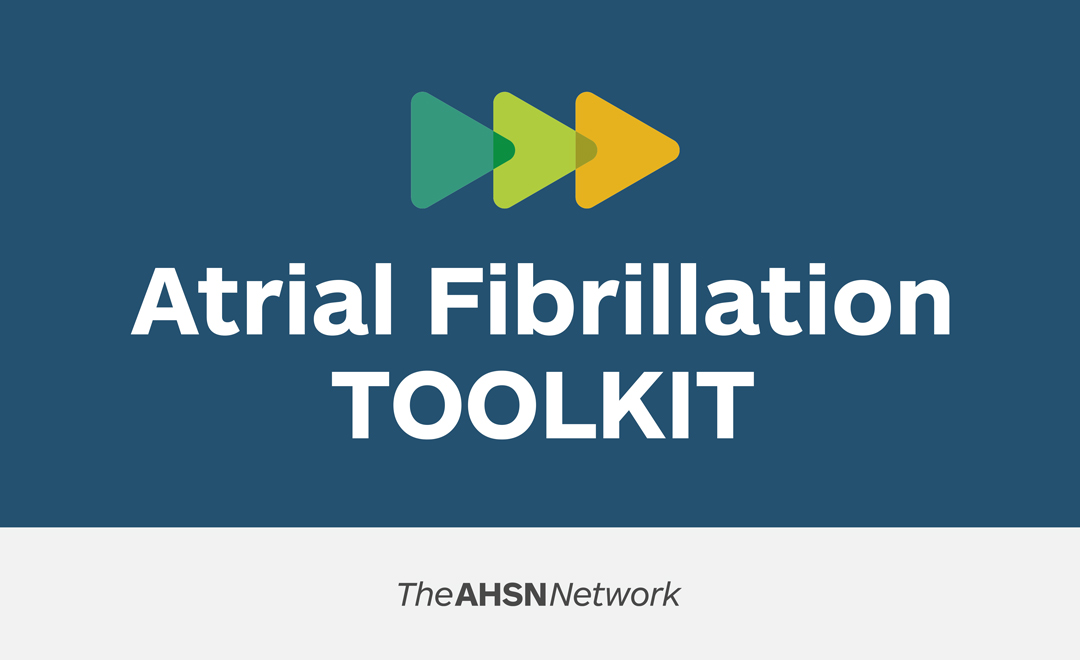Insight: How to prevent AF-related strokes
Every 15 seconds someone in the UK suffers an atrial fibrillation (AF) related stroke, accounting for 25% of strokes in all ages and 40% of strokes in patients over 80. AF is the single biggest risk fact for a patient suffering a deadly or debilitating stroke.
AF-related strokes represent a significant burden to patients, carers, the NHS and social care. The annual health and care costs for strokes are estimated at £4.38 billion.
While it is currently not possible to prevent all these AF-related strokes it is estimated that 7,000 strokes and 2,000 premature deaths each year in England could be prevented using oral anticoagulants which can reduce this risk of stroke by 64%.
However, a large number of the population are unaware they have AF and a large percentage of those who are diagnosed do not receive anticoagulation therapy, resulting in strokes that could have been avoided.

Intervention
The AHSN Network collectively identified that by enabling the spread and adoption of best practice across the country to improve the diagnosis and treatment of AF we could make a dramatic improvement in patients’ lives. Optimal detection and treatment of AF would prevent up to 14,200 strokes and save £240m in healthcare costs, according to the NHS report The Size of the Prize in Cardiovascular Disease Prevention.
Our national and regional programmes towards this goal draw on shared experience and intelligence in the key areas of detect, protect and perfect:
- Detect – Increasing the detection of AF through the use of manual pulse checks or mobile ECG devices means that patients can be given protective anticoagulation therapy.
- Protect – Increasing access to anticoagulant therapy, which prevents blood clots forming as easily and therefore prevents strokes in those diagnosed with AF.
- Perfect – We are optimising anticoagulation therapy in people newly diagnosed and those with existing AF.
Implementation across the east
Working closely with NHS England and local Clinical Commissioning Groups (CCGs), Health Innovation East distributed 500 mobile electrocardiogram (ECG) units to GP practices and other community settings across the region in 2018/19. Staff were trained in using the device, understanding the results and referring patients for specialist support.

This technology detects irregular heart rhythms quickly and easily, enabling NHS staff to refer patients for diagnosis and treatment. By enabling fast and simple screening in a primary care setting, GPs were able to target high-risk groups in existing appointments and refer them for a full ECG if a reading suggested they may have AF.
The West Norfolk Atrial Fibrillation Service
Health Innovation East supported West Norfolk Clinical Commissioning Group (CCG) in developing a new AF fast track service co-led by primary and secondary care. The service was developed to provide screening and diagnosis of AF, advice on treatment options, anticoagulation and counselling.
The pilot phase involved two large GP practices with a population of around 47,000. Patients screened using mobile ECG devices were referred to the service to access outpatient clinics at the Queen Elizabeth Hospital (QEH) Kings Lynn NHS Trust. The clinics ran twice a week and allowed patients to discuss their risk of AF-related stroke and choices related to anticoagulation medication.
Key to the success of this service weremonthly multi-disciplinary reviews with primary care, community and acute sector stakeholders to optimise care pathways.
In the first six months 44 patients were started on anticoagulant therapy and across the CCG the waiting time for AF patients referred to secondary care reduced from 26 weeks to one week. This led to QEH achieving a referral to treatment (RTT) rate of 95.5% (previously 80%) .
Screening and Optimising Stroke Prevention in Atrial Fibrillation (SOS-AF) service
Eastern ASHN supported Cambridge University Hospitals NHS Foundation Trust (CUH) to establish the Screening and Optimising Stroke Prevention in Atrial Fibrillation (SOS-AF) service. All people admitted to medical wards at the hospital routinely have a 12-lead ECG, which the team accesses through electronic patient records. All patients identified to have AF are offered support about their condition and advice on the risks and benefits of anticoagulation therapy. Where appropriate, treatment is started before people return home from hospital.
In the first 12 months, the team reviewed nearly 15,000 people. 401 patients were put on anticoagulation therapy or had their existing therapy optimised while conversations were had with 158 patients where it was decided that the risks associated with anticoagulation outweighed the benefits. In this first year, the SOS-AF team estimate that they prevented 16 AF-related strokes and 8 deaths (the number needed to treat with anticoagulation to prevent one AF-stroke is estimated at 25). Calculations using the median length of stay of a cardioembolic stroke in the trust (15.9 days) equates to reducing 254 bed days annually and an estimated saving to the Trust of £89,000.

Impact
Both the Screening and Optimising Stroke Prevention in Atrial Fibrillation (SOS-AF) service and the West Norfolk Atrial Fibrillation Service were featured in the AF Association Healthcare Pioneers Reports in 2019 and 2020 respectively, which recognises best practice in the identification, diagnosis, treatment and care of patients with AF and is used as a benchmark to improve services and care for patients with AF.
The table of results below show the data by the end of March 2020, in the East of England:
22,862
22,862 people were added to the AF register from the Health Innovation East region. As AF is a condition that is underdiagnosed, this achievement far exceeded our expectations for the region.
87.5%
87.5% of the number of eligible people receiving anticoagulation, which is above the national average
Who was involved?
The AF programme was funded by NHS England and NHS Improvement and involved Health Innovation East, the Clinical Commissioning Groups (CCGS) for our region, acute trusts and primary care.
Funding for the SOS-AF service was initially provided through the AHSN Network’s partnership with the BMS-Pfizer Alliance for Stroke Prevention in AF Competitive Grant Scheme. The service was introduced by Dr Kayvan Khadjooi (kayvan.khadjooi@addenbrookes.nhs.uk), Consultant in Stroke Medicine at Cambridge University Hospitals NHS Foundation Trust.

For more information on our work in detecting AF, contact Nick Clarke, Principal Advisor at Health Innovation East.
Useful links
thehealthinnovationnetwork.co.uk
References:
Saka O, et al. Cost of stroke in the United Kingdom. Age Ageing 2009;38:27-32.
Hart RG, et al. Meta-analysis: antithrombotic therapy to prevent stroke in patients who have nonvalvular atrial fibrillation. Ann Intern Med 2007;146:857-67.
AF Association. Atrial Fibrillation and Anticoagulation – Challenges and Considerations. 2012.

This toolkit provides methodologies, resources and support for commissioners and clinicians working to reduce AF related strokes. View it here.
Why is this impact story relevant to you?
Healthcare providers
We convene partners to secure funding for projects which can deliver patient impact.
We create connections to other organisations to spread best practice.
Get involved